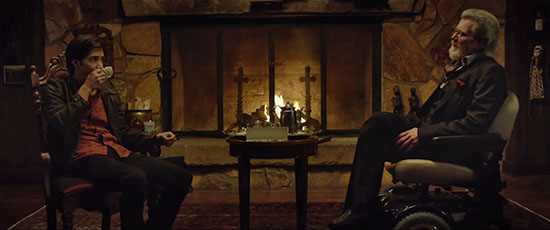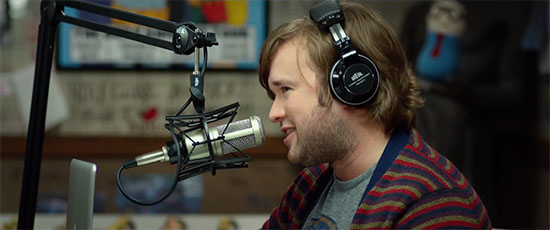
I think most of us knew that if Tusk was a failure, it had the potential to fail in a really fascinating way. The premise alone was zany enough to pique the interest of cinephiles who had written Kevin Smith off years ago, and the first Walrus-Man in cinematic history sounded like something I just had to see. I’m a listener of SModcast, the podcast in which the flick was conceived, so I’ve been in Smith’s corner on this one. My anticipation was fairly high. Now Tusk is upon us, and as many of you had predicted, it is a rather spectacular failure.
As you may know by now, the flick is about Wallace Bryton (Justin Long), the host of a popular podcast who travels to Canada to interview The Kill Bill Kid: a teen who recorded himself accidentally hacking his own leg off with a samurai sword. Wallace shows up in Canada just in time to discover that the teen has killed himself. Not wanting to leave Manitoba empty-handed, Wallace finds an ad written by Howard Howe (Michael Parks), an old seafarer who promises free room and board to anyone willing to hear his many stories. Wallace travels to Pippy Hill, the creepy mansion in which Howe resides, and soon finds himself captive and drugged. The conceit of the film is then revealed: Howe wants to turn Wallace into a fucking walrus.
Tusk is uneven to an insane degree. There are perhaps three scenes in the film that are, in all seriousness, truly great. The long tracking shot that reveals Howe’s mansion is one of the best shots in Kevin Smith’s filmography. The score by Christopher Drake is pitch perfect, elevating the film’s best scenes, and emulating the pounding drums of Fleetwood Mac’s Tusk (which plays later in the film). Michael Parks is giving the material more effort than it ever deserved, which is all the more impressive when you consider how silly his character is. Howard Howe is always what the scene needs him to be, which is not how good characters work. Good characters form the story, not the other way ‘round. Sometimes Howe is a creepily charming, eloquent man, sometimes a daffy old codger. The character is given a solid history, but the essence of the character is never really nailed down, and therefore we get no real character study.

Wallace, on the other hand, is extremely well-defined and exquisitely performed. Yes, exquisitely. I believe Justin Long is giving the performance of his career in Tusk. The film’s best scene happens over dinner, with Howe and Wallace sitting opposite one another at Howe’s vast dining room table. Long belts out a teary, screaming tirade that sounds like genuine terror. It gave me actual goosebumps. I’ve read a lot of reviews bemoaning his performance, but most of their complaints aren’t really about acting. They just don’t like the character, and for good reason. Wallace Bryton is incredibly grating; an unfunny stand-up comic turned egomaniac by his success in the podcasting world. People don’t enjoy the scenes of him being a dick because the alpha-male asshole magnetism that audiences latch onto just isn’t there. Instead, he repels us, which works to the benefit of both the narrative and the viewer. Wanting to see this asshole get walrus’d gives the story forward momentum.
Even without this forward momentum, things progress very rapidly. Much too rapidly, for my taste. Wallace’s physical transformation is completed way too early in the film, and this is a problem for several big reasons. The first reason is that delaying the reveal would have lent some additional drama when used in parallel with the B plot where Wallace’s best friend Teddy (Haley Joel Osment) and girlfriend Ally (Genesis Rodriguez) attempt to locate him. If Wallace had retained his (mostly) human appearance for longer, there would be drama and rising tension derived from the simple question of “will they find him in time?” Since we know at the halfway point that they never will, it’s just a matter of time until Teddy and Ally show up and the movie ends. Also, Wallace is non-verbal after the reveal, which I didn’t like because repetitive wordless bellowing is nowhere near as compelling as Long’s performance in previous scenes. Another reason the reveal should have been pushed until later is that we see too much of the “new Wallace”. The effect, while not completely awful, is shown too frequently, for too long, and under way too much light. The overhead fluorescents in the walrus den aren’t doing Robert Kurtzman’s effects team any favors. It’s a shame, because everything else in the creepy Howe mansion is lit beautifully.
The walrus effect is a problem as old as filmmaking itself: what needs to be shown to tell a story effectively? Filmmakers, as they are supposed to, fall in love with their images. This tends to be problematic during the writing process and in the editing room, especially in the case of Kevin Smith, who acts as sole writer, director, and editor. I’m also going to assume (perhaps wrongly) that he had final cut on this picture. To demonstrate my point, let’s take the scene when Wallace pulls up in front of the house of the poor kid who sliced his own leg off (the year’s worst CGI gag). Wallace notices a wreath of flowers on the front steps of the house, and looks at it quizzically. He then notices that there are a gaggle of cars parked nearby. Wallace then hears a woman wailing in (horribly acted) despair. He walks to the rear of the house to see a group of black-clad mourners gathered around the wailing woman. She wails some more, and then we see that they’re clustered around a photograph of the Kill Bill Kid. More wailing. Then, we cut to Wallace sitting in a bar, yakking loudly to Teddy about how the kid committed suicide.

These are classic examples of loose editing and overwriting. The sequence could have be trimmed down to a quick, non-verbal series of shots: Wallace notices a wreath of flowers on the front steps of the house, and looks at it quizzically. CUT TO: Wallace at the bar, texting Teddy about what happened. That’s all you need. It’s fast, economic, non-verbal, and subtle. Tusk, while admittedly kinda lean on a macro level, lacks economy and subtlety in its storytelling, and it may be because Smith had fallen in love with certain images, like the mourning family. Whatever the reason, the scene feels like a rusted cog. All the more disappointing is that there are some glimpses of clever nonverbal storytelling, like when the camera is locked down in Ally’s bathroom and we see that there are two cell phones side by side, plugged in and charging on the vanity. We instantly know what that means, and it’s a subtle, smart 21st century way to tell us what’s happening.
Perhaps the most disappointing/baffling/revelatory thing about the film is Johnny Depp’s uncredited performance as Quebecois gumshoe Guy LaPointe. He shows up at the halfway mark, and his first scene is a deafening blast of viewer bewilderment. It has to be seen to be believed. It is so crushingly stupid that it nearly transcends badness. I could barely contain my laughter when LaPointe tells Teddy to “ferme your fucking bouche!” What’s even stranger is that Teddy and Ally don’t seem to notice that they’re sitting across from Johnny Depp’s equivalent of a bad Mike Meyers character. They stare grimly at LaPointe, making the scene hilarious for all the wrong reasons. Five minutes later, after a seemingly interminable flashback that made me lose IQ points, I thought to myself: why is this scene STILL going on? At that thought, I literally had to cover my mouth. My body was shaking with laughter, and the theater around me was dead silent. It was a brand of terrible the likes of which I’ve never seen. The inclusion of Guy LaPointe and Depp’s incredibly bizarre performance mean that Tusk’s tone-deafness knows no bounds.
Tusk is a thudding failure that won’t soon be forgotten. Kevin Smith brings us some of his absolute best work, and Justin Long is kinda great, but these niceties are wrapped up in a really ludicrous and stupid movie. I suppose I’m impressed with Smith’s follow-through on this project, and I admire how accurately it represents his flight of fancy on that episode of SModcast. For what it’s worth, I’d rather have Tusk than another uninteresting raunchy rom-com, even if it’s mostly because Tusk is a really spectacular way to fail.
Rating: 




Out of a Possible 5 Stars